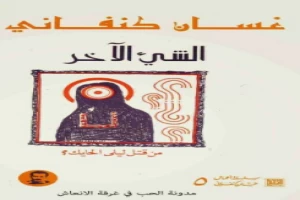Newly released
This book is new and will be uploaded as soon as it becomes available to us and if we secure the necessary publishing rights.

الشئ الأخر Book PDF
(0)
Author:
Ghassan kanfaniNumber Of Reads:
40
Language:
Arabic
Category:
literatureSection:
Pages:
131
Quality:
good
Views:
1145
Quate
Review
Save
Share
Book Description
Ghassan kanfani
Ghassan Kanafani: is a Palestinian novelist, storyteller and journalist Ghassan Kanafani is considered one of the most famous Arab writers and journalists in the twentieth century. His literary works were novels and short stories rooted in the depth of Arab and Palestinian culture. He was born in Acre, northern Palestine, on the ninth of April 1936 AD, and lived in Jaffa until May 1948, when he was forced to flee with his family, first to Lebanon and then to Syria. He lived and worked in Damascus, then in Kuwait and later in Beirut since 1960. In July 1972, he was martyred in Beirut with his niece Lamis in a car bomb explosion at the hands of Israeli agents. Until the date of his early death, Ghassan Kanafani published eighteen books. He wrote hundreds of articles on culture, politics and the struggle of the Palestinian people. In the aftermath of his assassination, all his works were republished in Arabic, in several editions. His novels, short stories, plays and articles were collected and published in four volumes. Most of Ghassan's literary works have been translated into seventeen languages and published in more than 20 countries, and some of them were directed in plays and radio programs in several Arab and foreign countries. Two of his novels turned into movies. His literary works, written between 1956 and 1972, are still of increasing importance today. Although Ghassan's novels, short stories, and most of his other literary works were written in the context of the cause of Palestine and its people, his unique literary talents gave them a universal appeal. He wrote mainly on Palestinian liberation issues, and he is a member of the Political Bureau and the spokesperson for the Popular Front for the Liberation of Palestine. In 1948 he and his family were forced to leave, so he lived in Lebanon and then in Syria. He completed his secondary studies in Damascus and obtained the Syrian baccalaureate degree in 1952. In the same year, he enrolled in the Faculty of Arabic Literature at Damascus University, but dropped out at the end of the second year. He joined the Arab Nationalist Movement, which George Habash joined when they met in 1953. He went to Kuwait, where he worked in primary teaching, then moved to Beirut to work in Al-Hurriya magazine (1961), which was pronounced in the name of the movement, in charge of the cultural section in it. The Lebanese Anwar. When the Popular Front for the Liberation of Palestine was established in 1967, he established a magazine called “The Goal” and Ghassan headed its editorship. He also became an official spokesman for the Popular Front for the Liberation of Palestine. He married a Danish woman (Ann) and had two sons, Fayez and Laila. He was diagnosed with diabetes early on, and after his martyrdom, Bassam Abu Sharif, editor-in-chief of the magazine, lamented his friend the Palestinian poet (Izz al-Din al-Manasra) with a poem that became famous in the seventies entitled (Accept Condolences in Any Exile). Among his books: A World We Don't Have Death Bed No. 12 - Beirut, 1961. Short stories. The Land of Sad Oranges - Beirut, 1963. Short Stories. Men in the Sun - Beirut, 1963. a novel. The story of the movie "Deceived". Umm Saad - Beirut, 1969. A novel. Returning to Haifa - Beirut, 1970. A novel. The Other Thing - Issued after his martyrdom, in Beirut, 1980. Short stories. Al-Ashiq, Al-Amma wa Al-Atrash, Barquq Nisan 5 (incomplete novels published in the volume of his complete works) Al-Qandil Al-Saghir - Beirut. The hat and the prophet. a play. The Stolen Shirt and Other Stories. short stories. bridge forever. a play.
Book Currently Unavailable
This book is currently unavailable for publication. We obtained it under a Creative Commons license, but the author or publisher has not granted permission to publish it.
Rate Now
5 Stars
4 Stars
3 Stars
2 Stars
1 Stars
الشئ الأخر Quotes
Top Rated
Latest
Quate
Be the first to leave a quote and earn 10 points
instead of 3
Comments
Be the first to leave a comment and earn 5 points
instead of 3